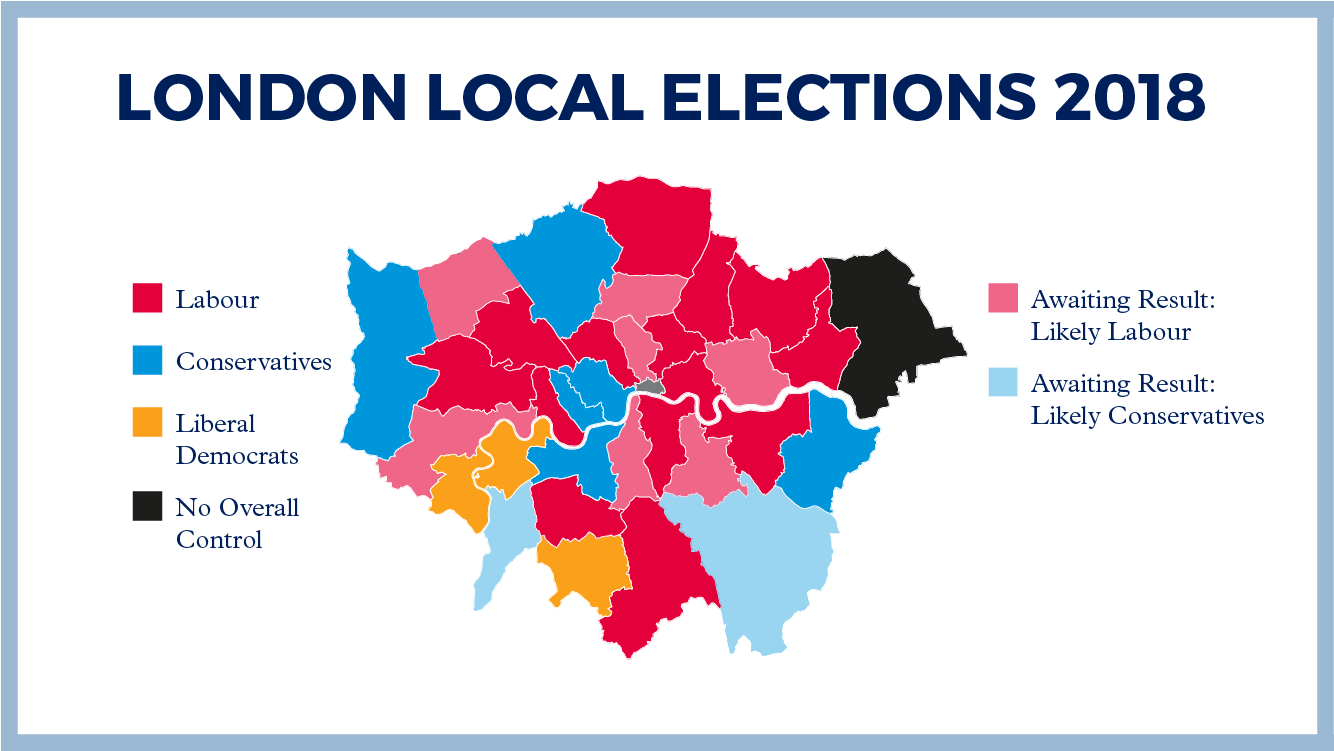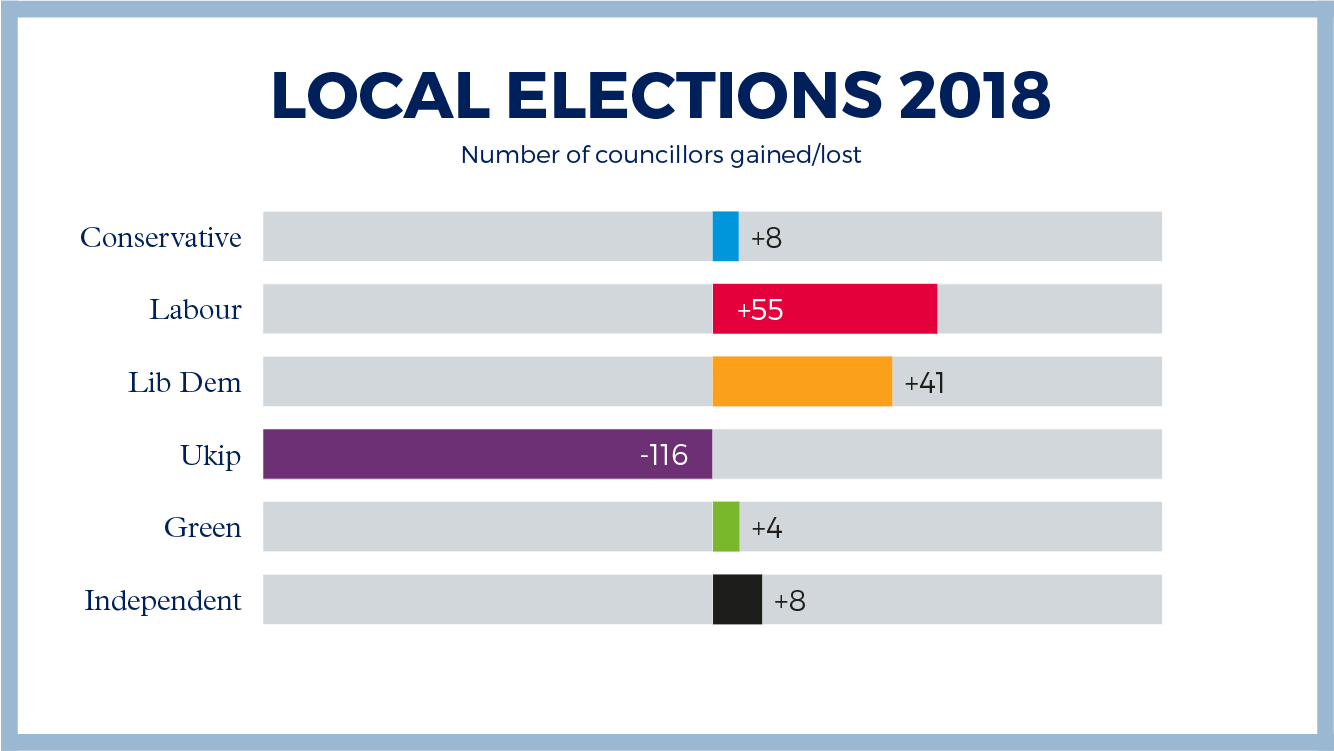This election – in theory – was meant to be about momentum (lower case ‘m’). Jeremy Corbyn’s Labour Party was going to continue the campaign momentum it gained in last year’s General Election to sweep the board.
Labour have made gains in some areas – but has its performance really been good enough?
As polling day approached, it was clear that Labour was beginning to regret its lack of expectation management at a London-wide and national level. At the start of the campaign, the talk was of London turning red – with Labour taking the London boroughs of Barnet, Wandsworth, Westminster and even the Royal Borough of Kensington and Chelsea. There was even talk of outer London bastions of Conservatism like Hillingdon falling.
While some in-roads have been made – with the Conservative majority reduced to just six in Wandsworth – they have failed to take any of their big targets. Westminster has been held by the Conservatives, albeit with some Labour gains, most notably with them taking a seat in West End ward.
In Barnet – which increasingly looked to be on a knife edge – Labour failed to take the wards they needed, with the Tories regaining control of the Council. This is perhaps their biggest disappointment of the night given where things were at the start of the campaign. The Conservatives held on to the Royal Borough of Kensington and Chelsea and even increased their majority in Hillingdon.
It is likely that the anti-Semitism row played a part in some areas of the capital – as did the various parties’ position on Brexit. Londoners who might have sought to oppose Brexit through their vote would have been confused as to exactly where to place it.

Labour has made gains but not necessarily where they needed. They are even stronger in boroughs where they were already strong – such as the London Borough of Hammersmith and Fulham where they increased their majority to 24 (+ 9). The blame game has already begun with some more established Labour voices criticising the way Momentum focused resources in unwinnable seats.
The London success story of the night was the Liberal Democrats who took Richmond Upon Thames from the Conservatives – obliterating a Tory majority of 22 (where Brexit appears to have played a part with four Greens also being elected) and handsomely held on to Sutton.
Of the London local authorities still to report, the ones to look out for are the Royal Borough of Kingston – whether the Conservatives will lose out to the Liberal Democrats – and Harrow, where there is an outside chance of the Conservatives bucking the London trend and taking the Council back from Labour.
Looking outside of London, the results for Labour are quite mixed and overall it appears that there has been a small swing to the Conservatives outside of the capital.
Labour have managed to move Trafford – a toehold of the Conservatives in the North West – to no overall control, becoming the largest party in the process.
They have managed to take Plymouth from the Conservatives, securing a majority of five and increased their majority in Bradford.
However, Derby has moved from a Labour held authority (albeit with a small majority) to no overall control as has Nuneaton and Bedworth. The local records of these two Labour administrations had come in for significant criticism in the last year so this feels like a case of local issues shaping the vote.
Basildon is a Conservative gain, moving from no overall control, as is Peterborough.
In Sheffield, Labour’s majority has been trimmed – potentially as a fall-out from the tree-felling row that has dominated local politics.
The Tories have held on to Swindon and Southend where they had precarious majorities of just one and two respectively, with the Conservatives profiting from the collapse of UKIP in Southend particularly.
Labour will be hoping that the inaugural mayoral election for the Sheffield City Region returns Labour’s Dan Jarvis. It’s worth recalling that Labour didn’t secure anywhere near the number of metro mayors it hoped for in 2017 so a victory here would be important.

To return to the expectation management game, despite strong Labour gains, the Conservatives have probably edged the battle and not endured a horror night predicted by some. Conversely, the Liberal Democrats with success in Richmond and Sutton, while also making in-roads into councils like Sunderland and Hull (where they took seats directly from Labour) can claim to have had a good night. Some commentators will put this down exclusively to Brexit but looking at Sunderland in particular, it is clear that the Lib Dems campaigned on local issues and took full advantage of a Labour authority in crisis in a Leave-voting area.
This set of elections seem to have entrenched the divisions that have been dominating politics for the last 18 months. Labour have made gains in the areas where they have been expected to do well: liberal – and often young, diverse and broadly Remainer – cities.
For Theresa May, the inverse. In Leave dominated areas, the Conservatives picked up seats or held majorities.
The emerging structural problem in British politics is that this division of voters is unlikely to yield a Parliamentary majority for either party. To seriously contest the next General Election, both parties are going to have to reach beyond their new comfort zones.

